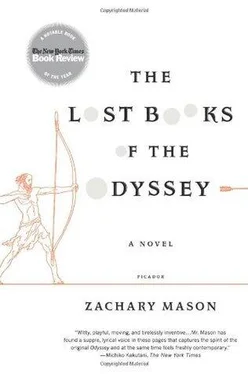Not long after that things went bad. I do not think she persecuted me — that would be beneath her — but I have felt her absence, and I think no river nymph or wind god will risk her hatred to help me. And I was reckless, after she left me, and I paid for it with my ships, all sunk now, and my men, all dead now, with no tombs to mark their passing.
*There was a race of cyclopes but one of them, Polyphemus, was the son of the sea god Poseidon. In the traditional version of the Odyssey , Odysseus blinds Polyphemus and thereby incurs Poseidon’s hatred.
A single fragment is all that survives of the forty-fifth book of the Odyssey :
Odysseus, finding that his reputation for trickery preceded him, started inventing histories for himself and disseminating them wherever he went. This had the intended effect of clouding perception and distorting expectation, making it easier for him to work as he was wont, and the unexpected effect that one of his lies became, with minor variations, the Odyssey of Homer.
Wounded pride justifies kidnapping, Agamemnon thought, when the pride is mine. He had just recruited the magus Odysseus from Ithaca by holding a sword to his infant son’s throat. He might have asked him to come but greatly feared the Trojans and dared not risk a rebuff. With characteristic self-assurance he assumed that his victim would soon accept his servitude as a fait accompli and embrace his, Agamemnon’s, purpose. Odysseus hated him as much for his presumption as for the kidnapping. From the bow of the ship he watched Ithaca recede and longed for his workshop, where he could have summoned a cackling sylph to seize Agamemnon and maroon him on the iciest peaks of the Caucasus. In the event he saw no option but biding his time.
A week out of Ithaca the ship touched at Syros. *Odysseus was told to go recruit the warrior Achilles, and to do it within a day, or he, Agamemnon, would sail back to the now unguarded shores of Ithaca — he always needed more slaves. Agamemnon said, “The oracle at Delphi decreed that Achilles must sail with me or I will find a bad death waiting when I come back from Troy. Of course you see why I chose you, of all my men, for this mission.” Odysseus was amazed to see that Agamemnon expected him to be moved by his fulsomeness. Nonetheless, he disembarked and went to the court of the Syrian king Polyxenos, an old friend and a fellow devotee of the hermetic arts.
Polyxenos told Odysseus that Achilles, late his ward, had died, bitten on the heel by an adder. His mother, the sea nymph Thetis, had appeared in a cloud of grace and nursed him but the poison was implacable and on the seventh day the boy went down to Hades. Odysseus held his head in his hands — not even a sorcerer could call back the dead and Agamemnon was a resolute and stupid man who prided himself on being unmoved by reason.
Polyxenos took pity on his friend and suggested that they use their arts to fashion a clay simulacrum of Achilles. Such an imitation would not withstand close inspection but it could fool everyone for a while. If need be, the double could be discretely dissolved in the sea. He observed that no one in the Greek army had ever set eyes on Achilles — who were they to doubt the Achilles they were given? Objections sprang to Odysseus’s mind but, as he had no better idea, he mastered himself and agreed with as much enthusiasm as he could muster.
In the small hours of the night the two lords crept out through the postern gate and filled canvas sacks with wet riverbank clay. By the time the moon set they were in the cool, dusty palace cellars, shaping the clay into a man. His proportions were heroic on the theory that idiosyncrasies are suspicious in an aristocrat but anything at all may be expected of a man whose very frame proclaims him half a god.
They lured a pretty young slave girl to the cellar with hints of assignation and preferment, and cut her throat as soon as she walked in the door. They hollowed out a cavity in the golem’s chest and filled it with her blood so that the golem could partake of her bloom. At cockcrow the girl’s body was buried under an oak tree and the golem was done down to the least hair. Odysseus carved the word “Life” into the prostrate thing’s forehead and its dull eyes opened.
The golem’s cheeks were flushed and his skin was as warm and smooth as newly fired porcelain. When he stood up he seemed to be jointless. Second thoughts swarmed in Odysseus’s mind — the hair did not look real, the skin tone was wrong for a Mycenaean, and his gaze had a strange, intense fixity. It was too late to change anything, though, so they girded him in armor, put a spear in his hand and told him that his name was Achilles. The golem did all they bade him do, opening doors and putting away knives and alembics, but for all their commands and cajolery he would not speak. Odysseus would have turned the thing back to dust and started over but Polyxenos reminded him that the king was waiting. He summoned his son Patroclus and told him to go with Odysseus and help sustain the ruse. In the first hour of daylight they swathed the golem in black cloth and hurried him onto the waiting ship.
Agamemnon was delighted to have avoided a bitter fate. Odysseus and Patroclus quietly monopolized their charge, who, on the rare occasions when they were not with him, stood board-straight by the railing and stared at the horizon. Odysseus explained his reserve as the hauteur of one more god than man, and Patroclus explained it as homesickness. Eventually Odysseus admitted to Agamemnon that Achilles was somewhat unbalanced by divine influences and unlikely ever to resemble an ordinary man — he had not revealed it earlier for fear of being accused of failing in his task and dooming his wife to shackles. Agamemnon laughed and told him he need not worry about such quibbles when he was dealing with a great-hearted man of honor.
At Troy, Patroclus shared a tent with Achilles and it was widely assumed that they were lovers. In fact, Achilles was tireless, endlessly biddable and intelligent enough to cook, mend and polish, which allowed Patroclus to live in the indolent luxury he craved.
Achilles’ eloquence in battle made up for his muteness and the ruse went undiscovered. Once Paris shot him in the face with an arrow at point-blank range — it stuck, quivering, in his cheek. Achilles pulled it out in a puff of dust, threw it away and went back to his bloody work. In the confusion of battle, with friend and foe besmirched with white earth and blood, he sometimes killed at random, ignoring the Greeks’ terrified, indignant cries, and so he became feared by Greek and Trojan alike.
Odysseus approvingly surveyed the stacks of Greek and Trojan dead piled up by his creation — the Trojans were a lawful enemy and mere foreigners besides, and as for the Greeks they were fools serving a fool of a king.
His delight in the ruse ended when Hector put his spear through Patroclus’s heart. Achilles saw Patroclus die and went to stand over the body, shooing Hector away and trying to rouse his dead friend. The Trojans circled warily — Achilles killed those who got too close. The battle moved away but Achilles stayed with the body through the day and the night, sometimes nudging Patroclus with his foot, sometimes looking around as though for help, but he was the only one left on the moonlit plain. On the morning of the second day some understanding of death must have seeped into his thick clay skull because without warning he snatched up a spear, ran half a mile toward the thick of the fighting and threw himself in headlong. He fought in a rage, killing Greek and Trojan indiscriminately. He ignored the cruelest blows and his arm never tired — the flower of both armies poured their blood onto the field and soon all fled, leaving Achilles standing listlessly among the bodies with a bronze sword dangling from his hand. He reversed the blade and thrust it at his abdomen, snapping it.
Читать дальше












